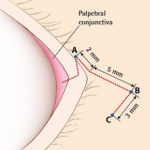In Asians double eyelid surgery is extremely common. It is also frequently done in conjunction with medial epicanthoplasty to eliminate the webbing of skin across the inner aperture of the eye. (epicanthal fold) But because many Asian eyes have a short horizontal length from the inner to outer eye corners, extending out the lateral length of the corner of the eye through lateral canthoplasty procedures is also done.
Unlike the medial epicanthoplasty, which does not really touch the inner corner of the eye, efforts at lateral canthoplasty do. Thus they have a higher rate of potential complications that involve separation of lid contact with the eyeball. (e.g. lid margin eversion, webbing) These risks are increased when the horizontal eye length is very short or has a high upturned out corner of the eye.

This lateral canthal lengthening technique uses a triangular flap that rotates 45 degrees out laterally to create its effect. Its simplicity avoids most complications and does not need to have a canthotomy to exhibit its effects.
Dr. Barry Eppley
Indianapolis, Indiana


